services forms the backbone of the public transport system, complementing the rail network and providing essential connectivity to all corners of the island. The public bus network is vital to Singapore’s transport policy, which promotes a car-lite society, with a robust bus network essential to achieving this goal.
In 2023, public buses in Singapore recorded around 3.75 million passenger trips daily, across 350 bus services. As of May 2022, the public bus fleet comprises around 5,800 buses with an average age of eight years.
Currently, public bus services are operated by four main bus operators (SBS Transit, SMRT Buses, Tower Transit, Go-Ahead) under the Bus Contracting Model (BCM). Under this model, the Land Transport Authority (LTA) (and by extension, the Government) retains ownership of all bus assets, including buses, infrastructure, and systems. Operators are contracted through a tendering process to operate, manage, and maintain these assets. Bus fares are charged based on distance travelled, and are also regulated by the Government.
In addition to these services, private bus operators offer Premium services and other Shuttle Bus services which further enhance the accessibility and convenience of public transportation options in Singapore.
Types of Public Bus Services
Trunk & Feeder Bus Services
Main Article: Basic Bus Services
Trunk services are the main arteries of Singapore’s public bus network, running long routes that connect various neighbourhoods and towns across the island, including routes into the city areas.
Feeder services, on the other hand, operate within specific neighbourhoods. Typically based out of bus interchanges with rail connections, these services provide crucial links within housing estates and play a pivotal role in Singapore’s hub-and-spoke transport system, which prioritises the rail network for long-distance trips, and buses for last-mile connectivity.
Some feeder services also operate in a dual-loop fashion (formerly known as Townlink or Intratown services). These routes serve as feeder services between neighborhoods and the town centres, while also connecting different neighborhoods within a town, eliminating the need for bus transfers at the interchange.
Operating alongside these basic bus services are route variants introduced to ply variants of their parent trunk routes, usually indicated by an alphabetical prefix or suffix attached to bus service numbers. Common ones used include A, B, and C for Short-Trip Services, M for ‘Modified’ / Route Variants, T for Terminating trips of Feeder services, and X for express feeder variants. A full list of these services can be found at Bus Service Prefixes and Suffixes.
Several types of bus routes that are subsets of trunk/feeder routes are:
- Short-Trip Services: Shortened versions of trunk/feeder routes
- Cross-Border Services: Connecting Singapore and Johor Bahru
- Jurong Industrial Services: Serving Jurong Industrial Estate (branding largely defunct)
- Limited-stop Peak Period Bus Services (formerly known as Express Feeder Services): Provides a faster connection than regular feeder bus services
Public buses are also deployed on Rail Replacement Services during extended rail disruptions.
Express & City Direct Bus Services
Main Article: Express Bus Services / City Direct Services
Express Services are designed with express sectors that involve skipping certain bus stops or utilizing expressways, resulting in shorter commuting times compared to regular trunk services. These services charge express fares due to their added convenience and time-saving benefits.
City Direct Services, on the other hand, operate during weekday peak hours between major residential estates and the Central Business District (CBD). These services charge express fares, and offer commuters an alternative to existing public transport connections to the CBD.
Employee bus services are for public transport workers and not for the general public.
Private Bus Services
Private bus services are run by private bus operators according to set timetables and routes. They enhance the public transport network by meeting specific transportation requirements, such as transporting commuters to workplaces or leisure destinations. These services are regulated by LTA under a Class 2 Bus Service Licence.
Premium Bus Services
Main Article: Premium Services
Premium Bus Services typically ply between major residential estates and key industrial/commercial nodes such as the Central Business District (CBD) or Industrial/Business Parks during peak hours. Designed to ease the rush-hour crowd, Premium Bus Services charge a premium fare but offer a more direct connection as compared to existing public transport options. Premium Bus Services are operated by private bus operators based on commercial considerations.
Shuttle Bus Services
Main Article: Shuttle Bus Services
Shuttle Bus Services are provided to meet specific transportation needs, including connections to places of interest, tourist attractions, commercial or retail centres, and medical institutions. These services are typically run by private bus operators and may operate either as fare-collecting or free shuttle services.
Regions with internal shuttle bus networks include Changi Airport, NUS/NTU university campuses, and Sentosa Island.
Cross Border Services
Private buses also operate cross-border bus services, connecting Singapore and Johor Bahru. More at Cross-Border services.
Scheme B Bus Services
Main Article: Scheme B Bus Services
Scheme B Bus Services (complement existing basic bus services by providing additional capacity primarily during peak hours. These services are provided by private bus operators, such as private-hire or school bus operators. These services are not well-known owing to low outreach and infrequent departures.
Legacy Services
Several categories of public bus services that have been discontinued since the 2000s include NightRider, Nite Owl, Parks, Chinatown Direct, Bus Parallel Service, Cityshopper, Citybuzz, SMRT Nightbus, Stadium Direct and City Shuttle Services.
Services discontinued before the 2000s include SBS Blue Arrow services, National Stadium special services, CBD special services, and SS-prefixed temporary shuttle services.
References:
- LTA | Bus [Accessed 4 Jun 2024]
- LTA | Bus Network [Accessed 4 Jun 2024]
- LTA Public Transport Statistics [Accessed 4 Jun 2024]
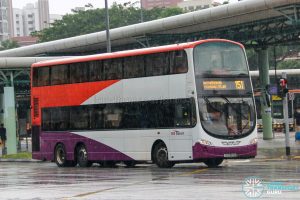
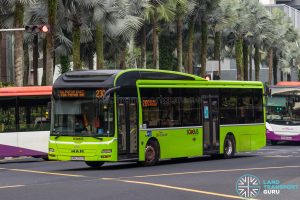
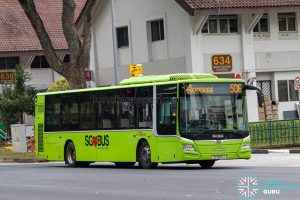
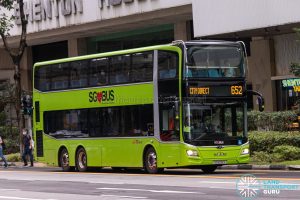
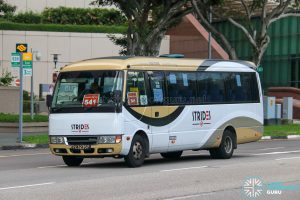
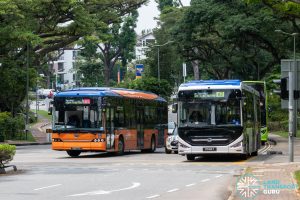
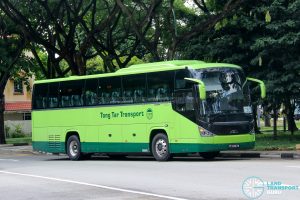
the old bishan bus interchange had been demolished away.hopefully,there will be a cafeteria that sells cheap food and drinks at the new bus terminal.the food shall be 1 to 2 dollars and tea shall be 50 cent per cup.there must also be private clinics that impose the same medical fees like the government polyclinic.i am a resident of yew tee,i wish there is buses to ang mo kio and bishan.
I highly recommend to introduce new Tower Transit bus service 978 and will be launched on 10 June with full fleet of Mercedes – Benz Citaro and some Man A22. It serves from Jurong East Interchange to Bukit Panjang Interchange (New) passes along Jurong East Central, Ave 1, Jurong Town Hall Road, Bukit Batok Road, Choa Chu Kang Road, Upper Bukit Timah Road –> to BP Int as Direction 1; from BP Int –> Bukit Panjang Road, Choa Chu Kang Road, Bukit Batok Road, Jurong Town Hall Road, Jurong East Ave 1, Central –> JE Int as Direction 2.
It is because sometime 160 can wait so long along Bukit Batok Road and 98/M along Jurong East Ave 1.
True good idea
There will be many students going to Punggol field walk from Jurong East. It will be convenient for them if share transport operates buses to and from west region to Punggol from next month.
Regards
I am looking for routes from tampines to alexandra. Please advice. Thanks.
I stay in ripple bay condo singapore 518163 pasiris drive 3 and my work location is at maple tree business city .is there any premium bus service ?